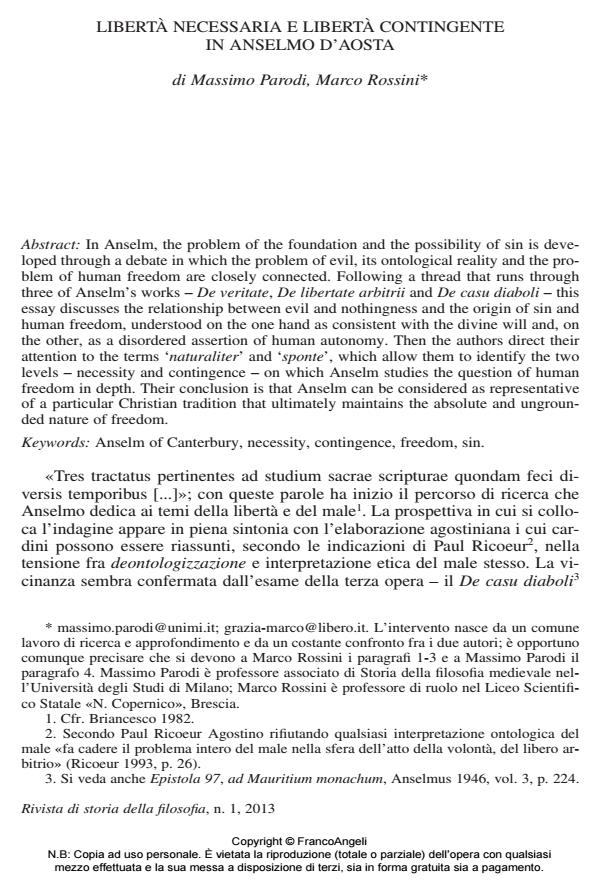Libertà necessaria e libertà contingente in Anselmo d’Aosta
Journal title RIVISTA DI STORIA DELLA FILOSOFIA
Author/s Massimo Parodi, Marco Rossini
Publishing Year 2013 Issue 2013/1
Language Italian Pages 22 P. 43-64 File size 510 KB
DOI 10.3280/SF2013-001004
DOI is like a bar code for intellectual property: to have more infomation
click here
Below, you can see the article first page
If you want to buy this article in PDF format, you can do it, following the instructions to buy download credits

FrancoAngeli is member of Publishers International Linking Association, Inc (PILA), a not-for-profit association which run the CrossRef service enabling links to and from online scholarly content.
In Anselm, the problem of the foundation and the possibility of sin is developed through a debate in which the problem of evil, its ontological reality and the problem of human freedom are closely connected. Following a thread that runs through three of Anselm’s works - De veritate, De libertate arbitrii and De casu diaboli - this essay discusses the relationship between evil and nothingness and the origin of sin and human freedom, understood on the one hand as consistent with the divine will and, on the other, as a disordered assertion of human autonomy. Then the authors direct their attention to the terms ‘naturaliter’ and ‘sponte’, which allow them to identify the two levels - necessity and contingence - on which Anselm studies the question of human freedom in depth. Their conclusion is that Anselm can be considered as representative of a particular Christian tradition that ultimately maintains the absolute and ungrounded nature of freedom.
Keywords: Anselm of Canterbury, necessity, contingence, freedom, sin.
- Anselmo 1992: Anselmo d’Aosta, Libertà a arbitrio, a cura di Italo Sciuto, Nardini, Firenze 1992.
- Anselmo 2008: Id., Opere filosofiche, a cura di Sofia Vanni Rovighi, con una premessa di P. Rossi, Laterza, Roma-Bari 2008.
- Anselmus 1946: Id., Opera omnia, a cura di Franciscus Salesius Schmitt, vol. 1, Edimburgi apud Th. Nelson 1946
- Briancesco 1982 : Eduardo Briancesco, Un triptyque sur la liberté. La doctrine morale de S. Anselme, Desclée de Brower, Parigi 1982
- Fredegiso di Tours 1998: Fredegiso di Tours, Epistola de substantia nihili et tenebrarum in Fredegiso di Tours, Il nulla e le tenebre, a cura di Franca D’Agostini, Il Melangolo, Genova 1998.
- Orazzo 2003: Antonio Orazzo, Analogia libertatis. La libertà tra metafisica e storia in sant’Anselmo, Edizioni San Paolo, Milano 2003.
- Pareyson 1995: Luigi Pareyson, Ontologia della libertà. Il male e la sofferenza, Einaudi, Torino 1995
- Ricoeur 1993: Paul Ricoeur, Il male. Una sfida alla filosofia e alla teologia, Morcelliana, Brescia 1993
- Sciuto 1989: Italo Sciuto, La semantica del nulla in Anselmo d’Aosta in “Medioevo” 15 (1989).
- Vanni Rovighi 1978: Sofia Vanni Rovighi, Libertà e libero arbitrio in Sant’Anselmo d’Aosta in Ead., Studi di filosofia medievale, vol. 1, Vita e Pensiero, Milano 1978
Massimo Parodi, Marco Rossini, Libertà necessaria e libertà contingente in Anselmo d’Aosta in "RIVISTA DI STORIA DELLA FILOSOFIA" 1/2013, pp 43-64, DOI: 10.3280/SF2013-001004